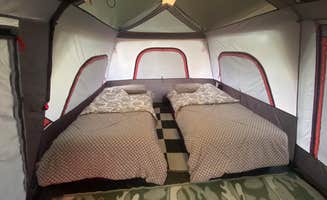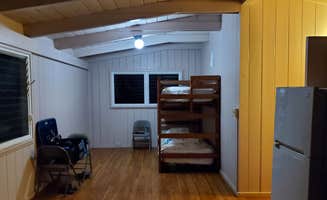Glamping close to Wailuku, Hawaii offers campers proximity to diverse ecosystems ranging from rainforests to volcanic terrain. The west-central Maui region experiences average temperatures between 75-85°F year-round with distinctive microclimates across the island. Campgrounds in this area can fill quickly during whale-watching season from December through April when advance reservations become essential.
What to do
Kayak rentals and tours: At Camp Olowalu, visitors can rent kayaks and paddleboards directly from the campground at budget-friendly rates. "Can take relatively affordable kayaking tours from the campgrounds or rent SUP/kayaks for very affordable rates," notes Tracy Jo I.
Star gazing after dark: Limited light pollution creates optimal conditions for nighttime astronomy. "Little light pollution, great for star gazing," reports Esther L. about the clear night skies visible from Camp Olowalu.
Morning hiking: Explore coastal trails early before day-visitors arrive. "Staying over night removed the time stress of doing the road to Hana. We were able to stop, hike, picnic, etc. as often as we wanted," explains Raphaela H., who recommends the 3-hour Pipiwei Trail in Haleakala National Park.
What campers like
Clean bathroom facilities: Waiʻanapanapa State Park Campground provides basic but functional facilities. "The bathrooms old and well used, showers are the outside beach variety with cold water and spectators. Potable water is available as well as a few Coke machines," reports Shari G.
Early beach access: Campers appreciate having beaches to themselves before day visitors arrive. "Perfect place to watch sunrise and enjoy the hot sandy beach early in the morning before the tourists start rolling in," mentions Emmanuel M. about the black sand beach at Waiʻanapanapa.
Washing stations: The dish cleaning areas make extended stays more practical. "In addition, there's also a cell phone charging station, and large sinks to wash your pots and pans," explains Jordan T., highlighting the practical amenities available.
What you should know
Noise considerations: Traffic and wildlife sounds can affect sleep quality. "Between 12am and 5am were the only hours that things seemed to die down... Then, about 5am, the feral roosters chime in to have their say, and the traffic begins. Long story short...bring earplugs!" advises Shari G. about Pālāʻau State Park Campground.
Wind exposure: Many camping areas lack natural windbreaks. "Beware the wind!!! Because it's open air with no shielding trees, sooo many people evacuated to sleep in cars or resigned to/woke up to collapsed tents because of high winds," warns Tracy Jo I.
Electrical access limitations: Plan for limited charging options. "We had a problem charging up our electronics and assumed that we might find electricity at the state park just like back on the mainland -- we were wrong. There wasn't an outlet to be found either in the park or even in the beach park," notes one camper.
Tips for camping with families
Pack insect protection: Mosquitoes can be persistent in tropical camping areas. "I would highly recommend bringing bug spray and lots of water," suggests Sasha W., who found that preparation made for a more comfortable family stay.
Consider cabin options: Families can benefit from structured accommodations during rainy seasons. "It was also intermittently pouring, so a cabin was ideal for our February stay," shares Raphaela H., noting that their cabin at Waiʻanapanapa had "3 sets of bunks (4 beds total in a bedroom and 2 beds in the living room)."
Prepare for weather fluctuations: Evening temperatures can vary significantly. "The only downside is that it did get hot during the night," reports one camper about glamping accommodations, suggesting families bring lightweight sleepwear even when daytime temperatures are moderate.
Tips from RVers
Limited designated sites: RV camping areas are often basic with minimal amenities. "We stayed in the camper van area, and while there was plenty of room and a nice picnic table, but it was exactly like camping on the perimeter of a large parking lot," notes Shari G.
Overnight privacy benefits: Evening hours offer a more secluded experience after day visitors depart. "The park closes at sunset for all the other visitors, but campers can come and go and feel like you have the place all to yourself at sunrise just before the early permit holders arrive," explains one camper at Waiʻanapanapa.
Wildlife awareness: Keep food secured from local wildlife. "Don't turn your back on the chickens. They'll get into your vehicle if given the chance," warns Stephanie about her experience with the persistent local roosters at Camp Olowalu.



